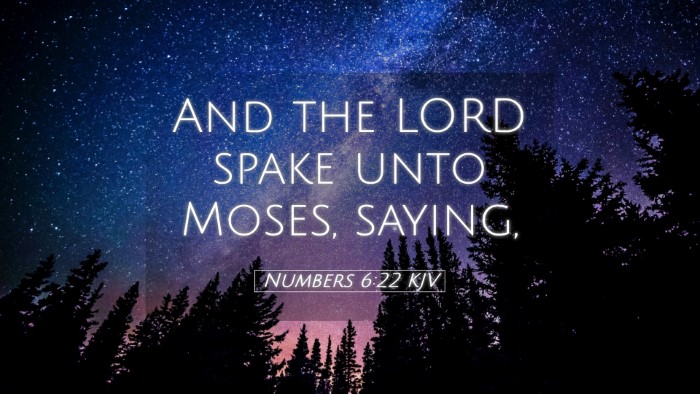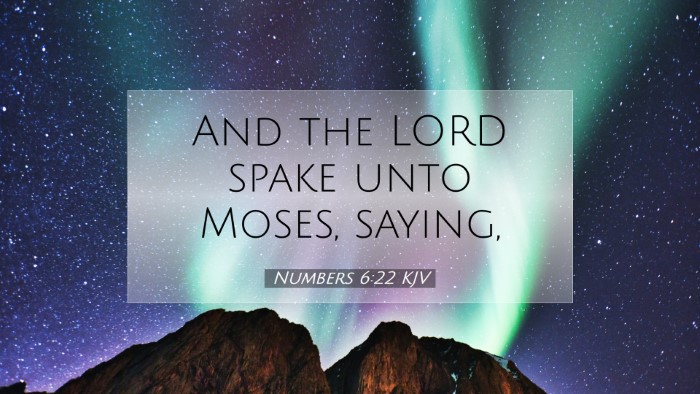Commentary on Numbers 6:22
Numbers 6:22 states, "The Lord spoke to Moses, saying, 'Speak to Aaron and his sons, saying, Thus you shall bless the people of Israel: you shall say to them, The Lord bless you and keep you...'" This verse introduces the famous Aaronic blessing, which serves both liturgical and communal functions within the Israelite society.
Contextual Overview
The Book of Numbers is situated in the context of the Israelites in the wilderness, where they are being organized as a covenant community following their exodus from Egypt. Numbers serves to record the journey of the Israelites, outlining their challenges, leadership, and God's guidance.
The Role of Aaron and His Sons
This command to bless comes through Moses to Aaron and his sons, who were designated as priests. This highlights the distinct role that priesthood played in mediating the relationship between God and Israel:
- Authority of the Priests: Aaron and his sons are called to convey God’s blessings, thereby affirming their divinely ordained role as spiritual leaders.
- Community Cohesion: The priesthood is critical in fostering a sense of unity and national identity among the Israelites through their shared worship.
The Nature of Blessing
The blessing declared in this passage encapsulates the essence of God's intention toward His people:
- The Lord’s Favor: The phrase "The Lord bless you" implies a gracious disposition from God, offering not just material prosperity but also spiritual well-being.
- Protection: "and keep you" expresses the assurance of God’s safeguarding presence amid potential threats, both physical and spiritual.
- Personal Relationship: This blessing signifies an intimate relationship, emphasizing communal and individual implications, indicating that God’s favor rests on all, yet is personally applicable.
Theological Implications
This verse has rich theological implications, drawing insights that resonate throughout scripture:
- Divine Assurance: The command reinforces the idea that God desires to bless His people and has instituted means by which this occurs.
- Intercessory Role: By employing the priests in this act, the text foreshadows the intercessory work of Christ, who mediates a greater blessing of salvation.
- Implication for Worship: The Aaronic blessing becomes a vital aspect of Hebrew worship and continues to find echoes in Christian liturgy, thus showing the continuity of God’s work across covenants.
Commentary Insights from Public Domain Sources
Matthew Henry
Matthew Henry highlights that the blessings pronounced are comprehensive in nature, addressing all aspects of life—spiritual, physical, and societal. He notes:
- “The blessing of the Lord extends beyond mere material gain; it encompasses peace, security, and well-being in all encounters.”
- “This benediction resembles God’s own attributes and character, highlighting His sovereign will to care for His creation.”
Albert Barnes
Albert Barnes emphasizes the importance of divine favor and its lasting impact:
- “This blessing is succinct yet profound, encapsulating the essence of Israel's relationship with their God, promising not only provision but also presence.”
- “In recognizing God’s protective keeping, believers are assured of God’s engagement in their daily lives.”
Adam Clarke
Adam Clarke offers a deep exploration of the implications of the blessing for the Israelite community:
- “The structured approach to blessing indicates a God of order, who cares deeply about the spiritual and physical well-being of His people.”
- “Clarke draws parallels between this blessing and other Scriptural blessings, illustrating the theme of divine grace that permeates the entire biblical narrative.”
Conclusion
In conclusion, Numbers 6:22 serves as a pivotal moment in the history of Israel and offers profound theological insights into God’s character and His desire to bless His people. The role of the priesthood and the significant directives delivered through Moses highlight the importance of interceding for the community. This passage not only remains relevant in Jewish tradition but also finds its resonance in Christian liturgical practices, affirming the ongoing truth that God desires to bless, keep, and guide His chosen people.


